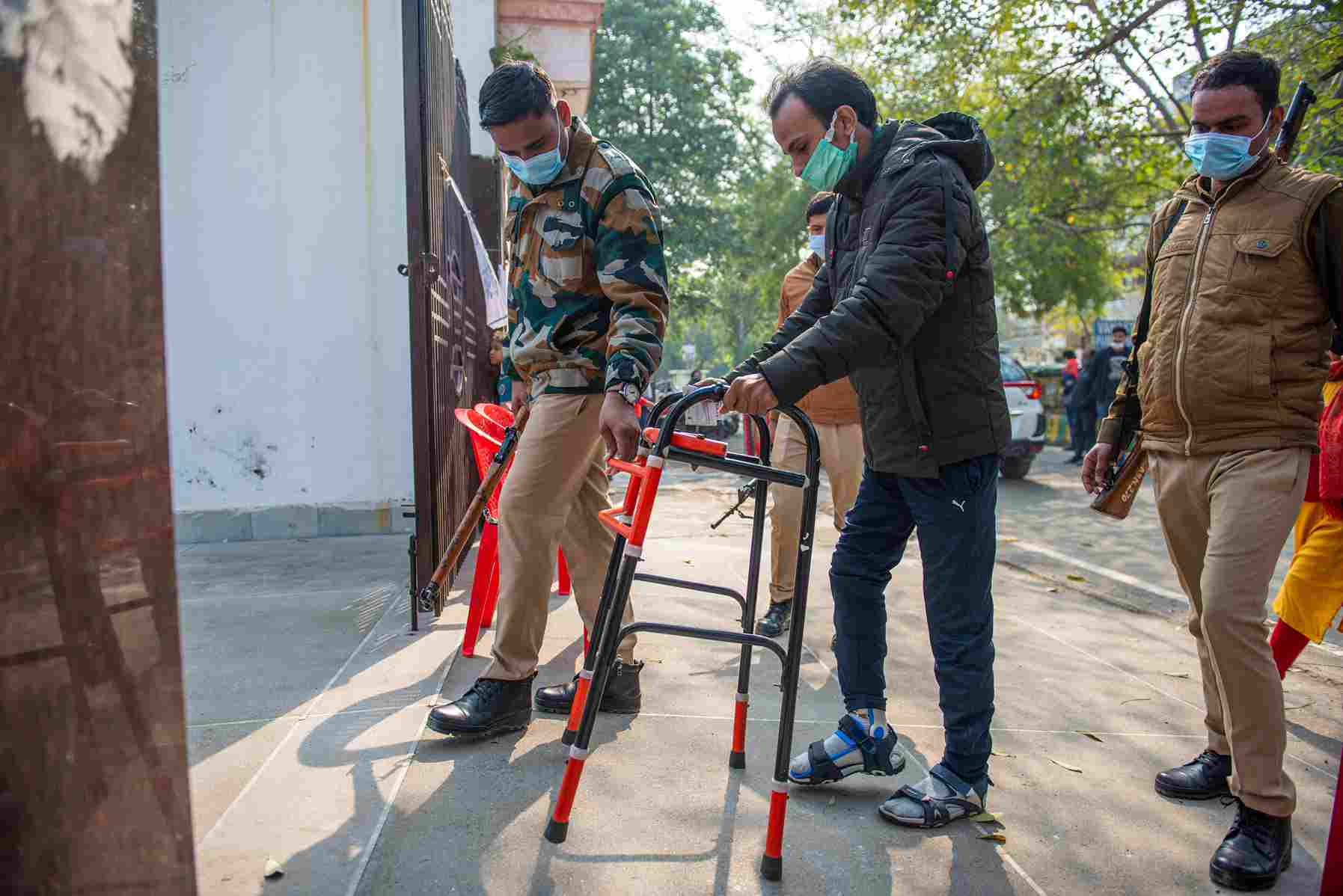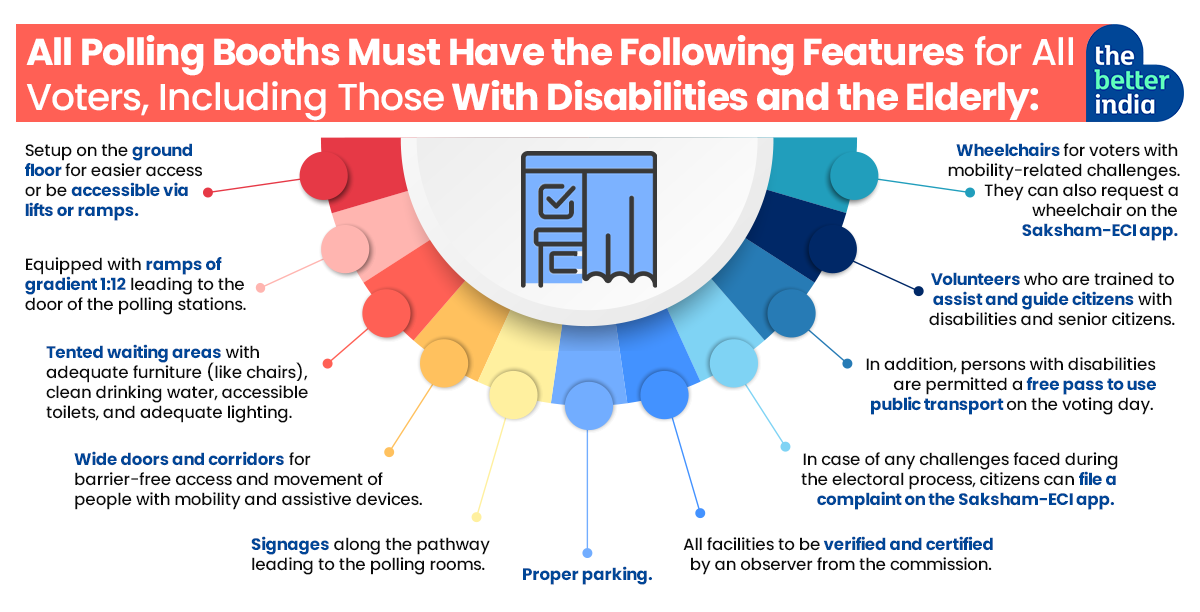Kavya had just turned 19 and was excited.
Not because she was older but because she would exercise her right to vote that year.
However, on polling day, she visited the booth with her family and her excitement waned. The polling station was not accessible for a . With stairs leading up to the EVMs, she wondered how she would cast her vote.
One of the officials on duty finally guided her to the back entrance which he claimed had a ramp attached. She rolled down the way only to find two flimsy wooden planks bridging an almost foot-long difference. With four people supporting her wheelchair, and a heavy feeling of being let down, Kavya cast her vote.

A disabled man being helped by a police officer into a polling booth in Ghaziabad, Uttar Pradesh in March 2022.
India is home to the largest population of . Almost 2.21 percent of its population has some kind of disability. The Rights of Persons with Disabilities Act, which was implemented in 2016, mandates accessibility of the electoral process under of the Act.
It bestows the responsibility on the Election Commission of India to ensure that all polling stations are accessible, with all necessary material related to the process available.
According to the Press Information Bureau, as many as have disabilities out of the 910 million people eligible to cast their vote. The same report states that the motto of the General Elections of 2019 was ‘Accessible Elections’ and several measures ranging from mapping electors with disabilities to their nearest polling stations, installing ramps, having Braille-embossed Electoral Photo Identity Cards and Electronic Voting Machines (EVMs), transportation facilities and sign language interpreters to make the process easier.
In a in The Hindustan Times, George Abraham, a social entrepreneur, inspirational speaker and disability activist, shared his experience of casting his vote with his wife, who escorted him. He was asked to fill up form 49A since he didn’t know Braille and relied on the support of his spouse to assist him.
“In the following weeks, my colleagues and I spoke to several blind and visually impaired people from across the country regarding their voting experience. Many were appreciative of the ECI’s efforts in making these elections accessible, while some cribbed of insensitive officials. There were a few booths where the Braille list of candidates was missing. But overall, these elections have been a tremendous improvement as far as inclusion of persons with disabilities was concerned,” he notes in the article.
Over the past few years, the call for accessible elections by civil society organisations as well as from within the ECI has become stronger.
“The momentum of accessible elections got high within ECI as well as across the country when National Voters Day in 2018 embraced its theme as Accessible Elections. At ECI, we had continuous discussions and worked on all possible facilitations at the polling stations to ensure hassle-free voting by our citizens with disabilities, thereby ECI issued a set of notifications/ circulars on the same to all Chief Election Officers. I also facilitated the inclusion of within the system to the ground level through their inclusion in Committees for accessible elections from national to state, district, and AC levels,” says Smitha Sadasivan, who works as an Accessibility Consultant in the Disability Legislation Unit of Vidya Sagar in Chennai.
Although efforts have been made by the Government to leave no one behind, gaps still exist.
“Right now, the gaps are in the right understanding of accessibility itself, its standards and facilitations at the ground level for which a lot of capacity building is needed within the election machinery,” Smitha adds.

While 2019 was termed as the Year of Accessible Elections, this year is one step ahead with the government now offering the facility to ‘Vote from Home’ or VfH to persons with disabilities over 40%, and those aged 80 and above.
Starting this year’s Lok Sabha Elections, persons with disabilities as well as senior citizens over 85 can register to vote from their homes using a postal ballot. This accommodation is only extended to people who register to do so in advance. The voters need to have appropriate paperwork proving their disability/age.
These postal ballots will be counted separately from the votes cast at polling booths and will be carried by the Booth Level Officers in a sealed envelope to ensure secrecy.
In case you need any more details about facilities for PwD voters, you can get them on the ECI’s official page
If you wish to speak to a representative from the Election Commission of India, you can call at 1950 between 9 am and 9 pm.
(Contributed by V-shesh; Edited by Padmashree Pande)
Not because she was older but because she would exercise her right to vote that year.
However, on polling day, she visited the booth with her family and her excitement waned. The polling station was not accessible for a . With stairs leading up to the EVMs, she wondered how she would cast her vote.
One of the officials on duty finally guided her to the back entrance which he claimed had a ramp attached. She rolled down the way only to find two flimsy wooden planks bridging an almost foot-long difference. With four people supporting her wheelchair, and a heavy feeling of being let down, Kavya cast her vote.

A disabled man being helped by a police officer into a polling booth in Ghaziabad, Uttar Pradesh in March 2022.
But did she feel like an equal citizen?
India is home to the largest population of . Almost 2.21 percent of its population has some kind of disability. The Rights of Persons with Disabilities Act, which was implemented in 2016, mandates accessibility of the electoral process under of the Act.
It bestows the responsibility on the Election Commission of India to ensure that all polling stations are accessible, with all necessary material related to the process available.
According to the Press Information Bureau, as many as have disabilities out of the 910 million people eligible to cast their vote. The same report states that the motto of the General Elections of 2019 was ‘Accessible Elections’ and several measures ranging from mapping electors with disabilities to their nearest polling stations, installing ramps, having Braille-embossed Electoral Photo Identity Cards and Electronic Voting Machines (EVMs), transportation facilities and sign language interpreters to make the process easier.
In a in The Hindustan Times, George Abraham, a social entrepreneur, inspirational speaker and disability activist, shared his experience of casting his vote with his wife, who escorted him. He was asked to fill up form 49A since he didn’t know Braille and relied on the support of his spouse to assist him.
“In the following weeks, my colleagues and I spoke to several blind and visually impaired people from across the country regarding their voting experience. Many were appreciative of the ECI’s efforts in making these elections accessible, while some cribbed of insensitive officials. There were a few booths where the Braille list of candidates was missing. But overall, these elections have been a tremendous improvement as far as inclusion of persons with disabilities was concerned,” he notes in the article.
Over the past few years, the call for accessible elections by civil society organisations as well as from within the ECI has become stronger.
“The momentum of accessible elections got high within ECI as well as across the country when National Voters Day in 2018 embraced its theme as Accessible Elections. At ECI, we had continuous discussions and worked on all possible facilitations at the polling stations to ensure hassle-free voting by our citizens with disabilities, thereby ECI issued a set of notifications/ circulars on the same to all Chief Election Officers. I also facilitated the inclusion of within the system to the ground level through their inclusion in Committees for accessible elections from national to state, district, and AC levels,” says Smitha Sadasivan, who works as an Accessibility Consultant in the Disability Legislation Unit of Vidya Sagar in Chennai.
Although efforts have been made by the Government to leave no one behind, gaps still exist.
“Right now, the gaps are in the right understanding of accessibility itself, its standards and facilitations at the ground level for which a lot of capacity building is needed within the election machinery,” Smitha adds.

While 2019 was termed as the Year of Accessible Elections, this year is one step ahead with the government now offering the facility to ‘Vote from Home’ or VfH to persons with disabilities over 40%, and those aged 80 and above.
Starting this year’s Lok Sabha Elections, persons with disabilities as well as senior citizens over 85 can register to vote from their homes using a postal ballot. This accommodation is only extended to people who register to do so in advance. The voters need to have appropriate paperwork proving their disability/age.
The process to register is as follows:
- 1. Make sure that you have the necessary paperwork. For persons with disability, this would be a Unique Disability Identification Card (UDID) and a valid proof of age matching the voter list with their Polling Booth for Senior Citizens.
- 2. Fill a Form 12D – Letter of intimation to Assistant Returning Officer (for absentee voters) and submit it to your respective Booth Level Officers. You can download the form using this .
- 3. Following this, the Booth Level Officers from your polling booth will visit your home once after the last date for withdrawal of nominations.
- 4. In the event that the voter is not available at home, they will return once more before 26 April (the last day of polling for this cycle of elections). If the voter is not available for the second time as well, they will lose their opportunity to vote.
- 5. Please keep in mind that once a voter has applied for a postal ballot, they no longer have the option to vote in person at the polling booth.
These postal ballots will be counted separately from the votes cast at polling booths and will be carried by the Booth Level Officers in a sealed envelope to ensure secrecy.
In case you need any more details about facilities for PwD voters, you can get them on the ECI’s official page
If you wish to speak to a representative from the Election Commission of India, you can call at 1950 between 9 am and 9 pm.
(Contributed by V-shesh; Edited by Padmashree Pande)
